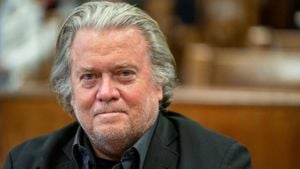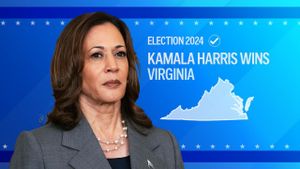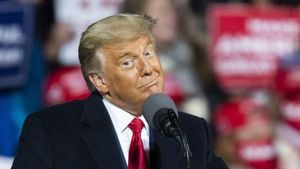Joe Rogan, the widely recognized podcaster and comedian, stirred the political pot once again with his recent endorsement of Donald Trump just hours before the 2024 presidential election. Rodan made the announcement through allusion to his interview with Elon Musk, declaring, "The great and powerful @elonmusk. If it wasn’t for him we’d be f*ked. He makes what I think is the most compelling case for Trump you'll hear, and I agree with him every step of the way. For the record, yes, that's an endorsement of Trump. Enjoy the podcast!" This endorsement achieved immediate traction, marking Rogan's arrival on the controversial side of mainstream political discourse, boasting his significant social media reach as well as his podcast's large audience.
The timing of Rogan's endorsement, coming after his podcast featured Trump himself, is not surprising. The episode with Trump ran for three hours, wherein both men poked fun at each other’s biases without indulging much substance. But the podcast is more than just entertainment; it is increasingly becoming pivotal for political figures seeking to connect with millions of congenial listeners, especially among the younger demographics.
Rogan’s show, formally known as The Joe Rogan Experience*, has evolved over the years, attracting both praise and criticism for its diverse array of guests, which includes prominent figures from various fields, from politics to psychology. Although Rogan claimed to identify as liberal early on, his pivot toward supporting right-wing ideologies has led some critics to label his platform as increasingly incendiary.
This is not the first time Rogan’s endorsement has injected vigor—a recent analysis suggested it might influence the young male voter demographic, particularly those inclined toward MAGA themes. There’s been extensive dialogue recently examining why many young American men are gravitating toward right-wing sentiments, often linked to figures like Rogan who package their views with humor and charisma.
Rogan’s choice to endorse Trump seems intended to solidify his standing with the young male MAGA base, which has been showcased through countless memes and discourse on social media. It also hints at Rogan's intent to remain relevant to his audience as political tensions crescendo leading up to the election.
By steering clear of endorsing the Democratic nominee, Vice President Kamala Harris—even after expressing admiration for her debate performance—it is evident Rogan is consciously aligning himself with Trump, adding him to a cadre of celebrity endorsements like Elon Musk and Hulk Hogan.
Shortly after Rogan shared his endorsement, Trump expressed his gratitude through social media, acknowledging Rogan's support as "a great honor." This symbiotic relationship allows both figures to cement their relevance within their respective circles: Trump's commitment to appealing to his base and Rogan's continued ascendance as the face of modern podcasting.
It’s increasingly clear Rogan’s endorsements are not merely casual gestures; they are calculated moves within a broader strategy. They signal to young voters disillusioned with mainstream politics to connect their grievances with solutions embodied by populist figures like Trump.
This endorsement furthers the growing hypothesis about cultural influencers reshaping political landscapes, often without holding themselves accountable for the numerous consequences. With the election hanging by the balance, every endorsement matters, and Rogan's signals potential consequences on voting trends.
Trump's revival resonates deeply within cultural narratives tied to masculinity, entrepreneurship, and vulnerability—facets Rogan often highlights within his podcasts. Critics assert his platform has subtly advocated for certain notions about power and masculinity, which resonate harmoniously with Trump’s own statecraft.
Joe Rogan's endorsement has sparked discussions and debates across various platforms, inviting both supporters and detractors to voice their opinions. While many praise his move to endorse Trump as lively engagement, others caution against the potentially harmful effects of such endorsements degrading the informative nature of public discussions.
Rogan’s opinions come with significant weight, often inspiring undecided voters to lean toward certain ideologies. The intertwining of celebrity culture and political endorsement blurs the lines between entertainment and informative politics, pushing both public figures onto a platform where scrutiny is harsh.
Both men thrive within discussion-based forms of media, often encouraging feedback loops of admiration and criticism. Yet, as Rogan's endorsement materializes within the increasingly divided political climate, it exemplifies just how influential figures wield sway over the sentiments forming the political identity of their audience.
To sum up, as audiences navigate this complex interaction of celebrity, politics, and culture, Rogan’s allegiances bring forth new questions about the powers and responsibilities of cultural influencers.



